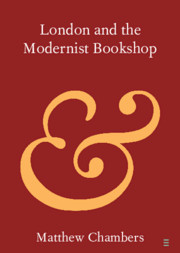Element contents
London and the Modernist Bookshop
Published online by Cambridge University Press: 17 April 2020
Summary
- Type
- Element
- Information
- Online ISBN: 9781108769853Publisher: Cambridge University PressPrint publication: 14 May 2020
References
Archival Collections
Beinecke Rare Book and Manuscript Library, Yale University
Marshall Library Archives, University of Cambridge
Marx Memorial Library, London
Centre for Research Collections, The University of Edinburgh
People’s History Museum, Manchester
Camden Local Studies and Archives Centre, London
- 8
- Cited by

